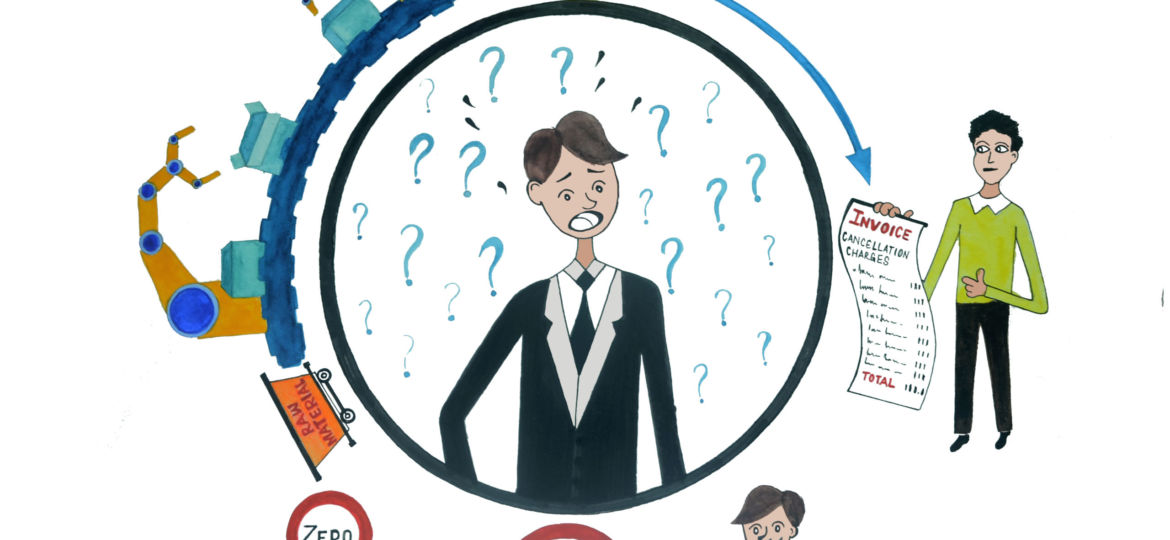In recent weeks, a widespread power outage impacted millions across Spain, Portugal, and southern France, disrupting commerce, transportation, and essential services. This large-scale disruption serves as a powerful reminder of the unpredictable events that can derail business operations—and the importance of being contractually prepared.
Force majeure clauses are a critical risk management tool in commercial agreements. They allocate responsibility when unforeseen events prevent one or both parties from fulfilling their contractual obligations. To be effective, these clauses must be carefully tailored to the specific needs and risk profiles of the contracting parties. Below are key considerations for drafting force majeure provisions that are both comprehensive and enforceable:
Commercial Contracts
Artificial intelligence (AI) is changing the game for businesses, generating everything from artwork to legal documents. But when an AI tool produces something valuable, who owns it? The legal side of this is still evolving, and the answer depends on where you are and how much human input is involved. This article breaks down the key points under both EU and US law, focusing on copyright and contracts—without the legalese.
The laws in the European Union (EU) provide consumers with the right to change their minds and cancel online purchases within a 14-day period. However, questions have emerged about the applicability of this right when subscriptions automatically renew, especially post a free trial. The European Court of Justice (ECJ) provided clarity on this issue through a case involving a dispute between a consumer protection association and an online learning platform in Austria.
Are you a professional planning to develop your own software? Here’s a brief guide to key EU laws and regulations you should know to prevent potential issues.
Understanding dilution is crucial for founders, particularly as they seek investment and scale their businesses. When high-growth companies attract investor capital, some level of dilution is expected. So here are five essential points every founder should know about dilution.
This article aims to provide practical guidance for businesses that supply or purchase hardware and software and explores warranties in software and hardware supply contracts – what they cover, common warranties and warranty disclaimers, and practical tips to help you understand these contractual terms.
Enforcing the Digital Services Act (DSA) involves a broad spectrum of investigative and punitive measures accessible to both national authorities and the European Commission. The Commission takes the lead in supervising and enforcing the DSA, assisted by Digital Services Coordinators and the Board.
The term “dark patterns” has become increasingly relevant, sparking concerns among online businesses. Recent actions by EU authorities have placed a spotlight on these tactics, prompting companies to revaluate their digital strategies. In this article, we’ll delve into what dark patterns entail, explore their legal ramifications, and offer insights for businesses navigating this landscape.
You’re scrolling through your favorite dating app, hoping to find a connection, when suddenly you discover that the prices you see aren’t the same as what others are seeing. Imagine the frustration of realizing that the premium services you desire come with a price tag tailored specifically for you, without your knowledge. It’s akin to navigating a maze blindfolded, unsure of whether you’re getting a fair deal or not.
A software licence is an agreement between the creator or provider of the software (the licensor) and the user (the licensee). Unlike buying a physical product, purchasing software doesn’t transfer ownership of the software itself to you. Instead, you’re granted permission to use the software according to specific terms and conditions laid out in the licence agreement.
The European Parliament recently approved the Artificial Intelligence Act (AI Act) on March 13, 2024, which is set to establish comprehensive regulations governing the use of artificial intelligence (AI) within the European Union (EU). Much like the influential impact of the General Data Protection Regulation (GDPR) on data privacy, the AI Act aims to set a global standard for AI regulation by imposing obligations on AI systems based on their potential risks and impacts.
The laws in the United Kingdom (UK) and the European Union (EU) provide consumers with the right to change their minds and cancel online purchases within a 14-day period. However, questions have emerged about the applicability of this right when subscriptions automatically renew, especially post a free trial. The European Court of Justice (ECJ) recently provided clarity on this issue through a case involving a dispute between a consumer protection association and an online learning platform in Austria.
The Digital Services Act stands out as the most important and ambitious regulation globally in the realm of protecting the digital space against the spread of illegal content and safeguarding users’ fundamental rights, heralding a safer and more equitable online environment throughout the European Union (EU). With the deadline for compliance approaching, this article breaks down the crucial next steps to help your online business get on the right track.
When selling products or services online, having fair and clear rules in your contracts with customers is crucial. These rules, often outlined in Terms and Conditions (T&Cs), need to be done right – presented correctly, at the right time, and definitely without any blacklisted, grey-listed, or otherwise unfair terms.
The European Commission has officially opened formal proceedings against X, formerly known as Twitter, under the Digital Services Act (DSA). This formal action aims to determine if X has violated the DSA in areas such as risk management, content moderation, dark patterns, advertising transparency, and the provision of data access for researchers. This is the first time the commission has launched formal proceedings under the DSA.
The European Union’s Digital Services Act (DSA) has ushered in a set of regulations to govern online services. For businesses operating beyond the EU but catering to its customers, a new rule mandates the appointment of a “legal representative”. In simple terms, this article breaks down why this requirement matters and how it helps your business follow the DSA.
As Black Friday, Cyber Monday, and Christmas deals approach, online businesses operating in the European Union (EU) need to be mindful of the regulations governing promotions and sales. Reports of shopping scams and strict penalties for misleading practices emphasize the need for online retailers to align their promotional strategies with both legal and consumer expectations.
Software escrow is a mechanism through which a software’s source code is deposited with a neutral third-party escrow agent. This is commonly used in licensing arrangements where the licensee wants to ensure they can maintain and operate the software if the licensor becomes unable or unwilling to provide ongoing support or maintenance. The escrow agreement sets out the conditions under which the source code will be released to the licensee.
As Artificial Intelligence (AI) cements its role as a cornerstone of innovation across various sectors, the legal frameworks governing its use are rapidly evolving. The landscape is abuzz with legislative developments, such as the proposed AI Act by the European Union and the Biden administration executive order on AI. As lawmakers and industry leaders shape new AI regulations and ethical guidelines, the complexity of AI-related contracts is on the rise. In this article, we’ll explore the key elements that your AI-related contracts should include to be as robust as they are compliant.
Within the world of open-source software, every line of code comes with its own set of rules. Whether you’re an innovative startup crafting the next big app or a seasoned enterprise integrating third-party solutions, understanding the nuances of open-source licenses is paramount. This article is here to help you understand the most popular licenses, their implications, and the practicalities that businesses often overlook. Navigate with confidence and chart a course to licensing clarity.
In the dynamic landscape of cloud-based computing services, organisations have come to rely on the flexibility and scalability offered by various models, such as Software as a Service (SaaS), Platform as a Service (PaaS), and Infrastructure as a Service (IaaS). However, alongside the advantages these services bring, negotiating contracts that accurately reflect the unique aspects of each model is crucial. This article delves into the differences between SaaS, PaaS, and IaaS, explores the challenges in contract negotiations, highlights essential contractual provisions, and provides practical tips to navigate these complexities effectively.
The way businesses work and connect with customers has changed a lot in the digital age. To adapt to this changing landscape, the European Union (EU) has introduced the Digital Services Act (DSA), a ground-breaking regulatory framework designed to govern digital platforms and services and established a new set of rules to regulate these service providers.
As the digital landscape continues to evolve, the UK government is taking action to regulate digital markets and change its competition and consumer protection regimes. One example is the proposed Digital Markets, Competition and Consumers Bill (DMCC), which aims to significantly improve consumer protection, enhance the enforcement powers of the UK’s Competition and Market Authority (CMA) and introduce substantial penalties for non-compliance. In this article, we will explore the key objectives of the DMCC and its implications for online businesses.
Gift cards have become a popular option for offering gifts and rewards in the Business-to-Consumers (B2C) domain. As a business operating in the UK, it is crucial to understand the legal rules surrounding gift cards to protect both your customers and your business. In this article, we will outline the key legal rules that gift card providers should be aware of and explain how you can comply with them.
Revolutionary technologies such as the Internet of Things (IoT) and autonomous vehicles are reshaping industries worldwide. As these innovations advance, understanding and managing liability in contracts becomes paramount for all stakeholders involved. In this article, we provide practical tips to help businesses successfully navigate liability issues within IoT and autonomous vehicle commercial contracts.
Social media giant WhatsApp has made a significant commitment to improving transparency and user rights concerning changes to its terms of service. In response to a joint action led by the European Consumer Organisation (BEUC), Competition and Consumer Protection Commission (CCPC), the Swedish Consumer Agency, and the European Commission (EC), WhatsApp has agreed to implement measures that ensure users are well-informed about the impact of updates to its terms of service. In this article, we will describe WhatsApp’s commitments and the implications for users, as well as highlight how other online companies can learn from these developments.
Recent findings from the CPC Network have brought to light worrisome practices regarding recurring subscription payments in the European Union (EU). These practices have led many customers to unwittingly sign up for unwanted subscriptions, thanks to deceptive techniques employed by online businesses (for more information, click here). It was discovered that 10% of EU consumers have fallen victim to such unwanted subscriptions in the past. In response, the European Commission, in collaboration with the CPC Network, worked with major card schemes like Mastercard, VISA, and American Express to introduce new rules that promote clarity and informed decision-making for consumers.
Online platforms have become the go-to destinations for individuals seeking information, products, and services. In this context, search result rankings have become an essential feature, enabling users to easily search for products or compare different options. Think of it as a virtual personal shopper, always at your service, showing results that are (supposedly) tailored to your preferences.
As an online business operating within the European Union (EU), it is crucial to be aware of the legal obligations and mechanisms in place to ensure consumer protection and dispute resolution. The European Online Dispute Resolution (EU-ODR) platform is a vital component of this framework. In this article, we will explore the EU-ODR platform and the key obligations, providing valuable insights for online businesses in the EU.
The European Commission has confirmed 19 online platforms and search engines identified as ‘very large online platforms’ (VLOPs) and ‘very large online search engines’ (VLOSEs) for the purposes of the EU’s Digital Services Act (DSA). Such companies must comply with the most stringent rules of the DSA.
Business parties typically have the freedom to decide the terms and conditions when writing international commercial contracts. The problem is that disputes arise more often than not, which can lead to litigation, arbitration or other forms of dispute resolution involving such agreements.
If you’ve decided to offer gift cards on your website, you’re not alone. The gift card industry in Europe was valued at $140.1 billion in 2021 and is expected to grow fourfold by 2032, a 12.4% compound annual growth rate. Closed-loop gift cards, which are limited to purchasing good and services at the merchant listed on the card, are a terrific way to gain new business and increase sales. Open-loop gift cards offer…
Gift cards are popular with consumers for many reasons. They are easy, last-minute gifts that let the recipient choose something they want. But imagine the following scenario: you order a gift card for your niece at her favourite store. You brag to your sister about it only to find out that the store was last year’s news. She’s moved on to the latest influencer-inspired trend. To be the cool Aunt, you want to return the gift card, so you can buy her one at her new favourite store. As you bought the card online in the EU, you have 14 days to change your mind. So, what do you need to know as a business about the right of withdrawal for gift cards?
The EU’s Digital Services Act (DSA) came into force on 16 November 2022. In our previous article on the topic, we introduced some of the key requirements of this new legislation affecting online service providers in the EU. While most of the DSA’s obligations will only start to apply from 17 February 2024, specific transparency obligations will already come into effect from 2023. In this article, we look at this upcoming DSA deadline and outline what it means for online businesses in the EU.
One of the key provisions introduced by PSD2 was a set of security requirements for electronic payment processing, which includes the so-called “strong customer authentication” (SCA). SCA rules have a significant impact on the lives of online businesses and consumers.
One of the key documents for any online business is a good set of general terms and conditions of sale. These are the rules that apply to your agreement with your customers which will help them know where they stand and also protect your business.
Choosing a good partner is crucial to the success of any outsourcing initiative. In some ways, it can be like a marriage. You look for a partner that complements you, that brings something different to the table, but who you can also trust and grow with. Planning and having a clear goal of what you want to achieve through that partnership is an important part of the process.
Replacement of “Black Friday” with “Green Friday” (they say Green is the new Black), increase in reported shopping scams and high penalties for misleading practices are just some of the complaints and effects associated with certain Black Friday deals and other online sale campaigns.
Today’s world is in flux. Employees have discovered the joys (and pains) of remote work. Location no longer matters for most professions, even retail. Freshii, a Canadian take-out, uses virtual cashiers based overseas to take orders. Virtual conferencing such as Zoom or virtual worlds such as “Decentraland”, enable face-to-face collaboration from anywhere on the planet.
Nearly eighteen months after the European Commission first proposed a Digital Services Act (DSA), on July 5, 2022, the European Parliament finally approved the final version of the DSA. The DSA is a legislation package applicable across the European Union (EU).
Terms and conditions are a set of rules. These rules generally form a contract between you, the user, and the service provider, whose website you are visiting. The terms of that contract are set out in the website’s terms and conditions, which explain what you are and are not permitted to do on the website and with its content.
Poor supplier performance can result in significant (10-20%) indirect costs. However, by applying certain risk management practices to your operations, you can reduce your risk significantly.
If you are involved in e-Commerce in the EU, you have probably heard of the Omnibus Directive, which came into force on 7 January 2020. A “New Deal for eConsumers” the Omnibus Directive focuses on protection for e-Commerce consumers that was not covered in the earlier EU package of legislation on consumer protection.
According to a 2018 McKinsey article, poor supplier performance can result in significant (10-20%) indirect costs. Proper planning and making sure you have the right terms and conditions in your supply agreement will reduce your company’s financial exposure and protect it from litigation.
If you operate an e-commerce website in the European Union (EU) that sells to consumers you must provide certain key information so that the consumer can make an informed purchase decision i.e. whether or not to buy. This information must be made available …
In this article we’ll focus on what company information is available to the public regarding companies registered in California.
In California, you can search for information on a business entity through the website maintained by California’s Secretary of State.
Small and Medium Sized Enterprises (SMEs) face numerous challenges related to managing copyright. These challenges are due to characteristics such as size (SMEs range from 1 to 250 employees), availability of resources (including those other than human resources) and market position.
If you own the copyright in a work, you are free to exploit it on your own or license the use of it to another party (such as a book publisher). ‘Exploit’ in this context means to develop or make use of it. When considering whether to license your work, you should assess whether or not you are truly the owner of the work in question.
When entering supply agreements, buyers and sellers have competing interests around the volume of goods to be purchased or supplied. A buyer wants maximum flexibility on the volume of goods it will order, while seeking favorable pricing and security that the seller can provide the volumes the buyer needs. A seller, on the other hand, wants the buyer to commit on the volumes it will purchase, so the supplier can plan its production, ensure predictable sales, and align pricing with volumes.
Vicky Walker, a world-famous French surgeon, came up with an innovative idea but she needs help to produce it. She meets with a third party and discloses her idea as they discuss a potential deal. But wait, did she act wisely?

![FireShot Capture 134 - Free Vector - Artificial intelligence abstract concept illustration_ - [www.freepik.com]](https://www.loganpartners.com/wp-content/uploads/2025/03/FireShot-Capture-134-Free-Vector-Artificial-intelligence-abstract-concept-illustration_-www.freepik.com_-thegem-blog-default-large.png)













































